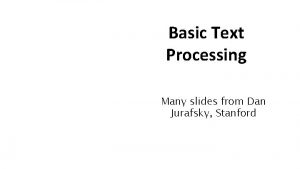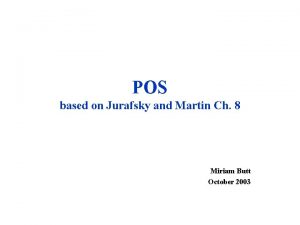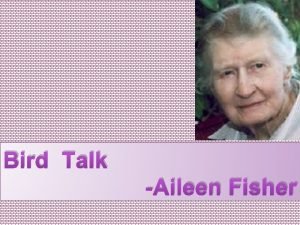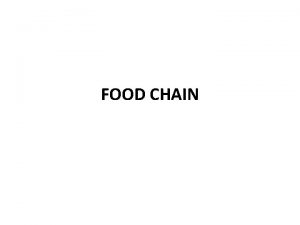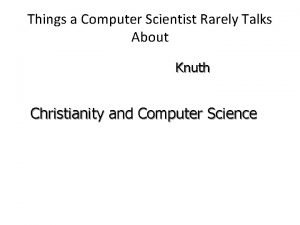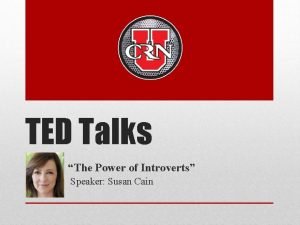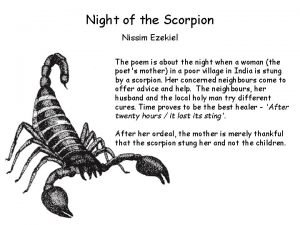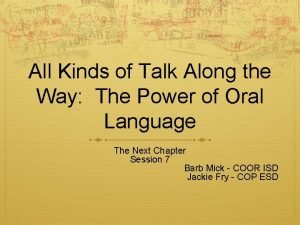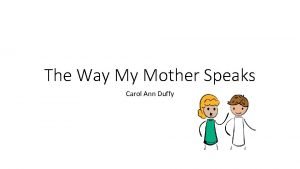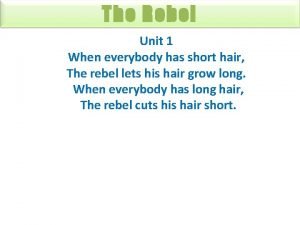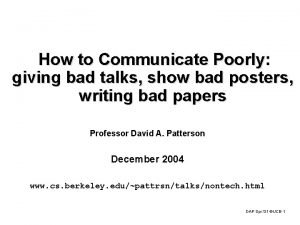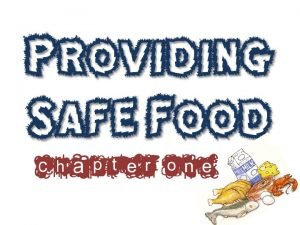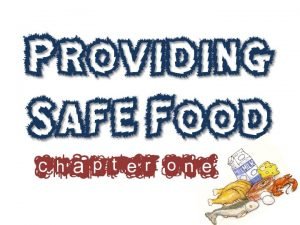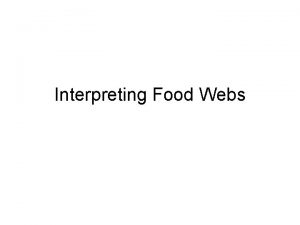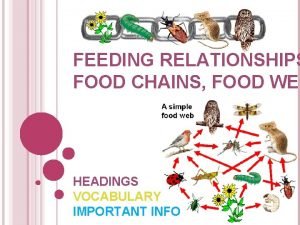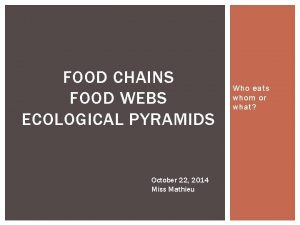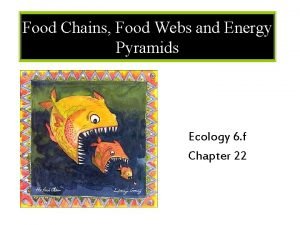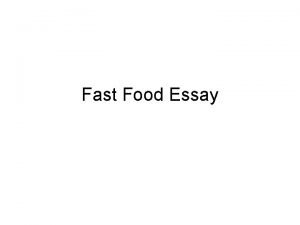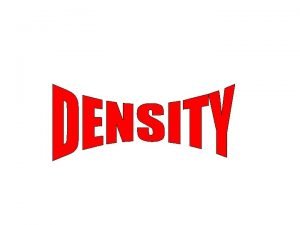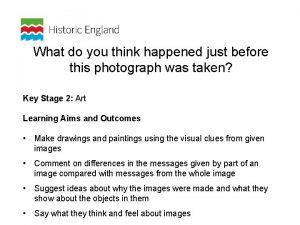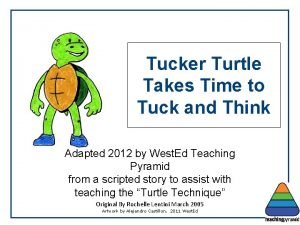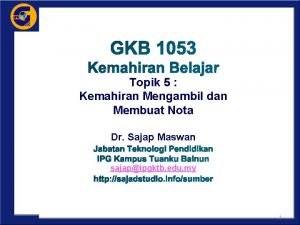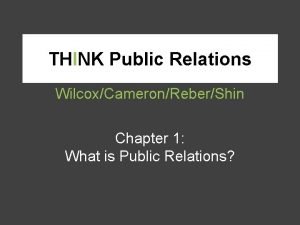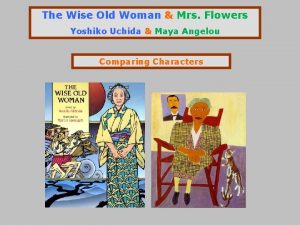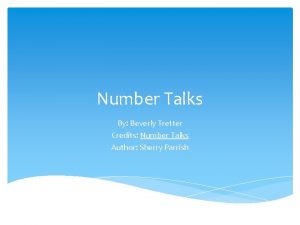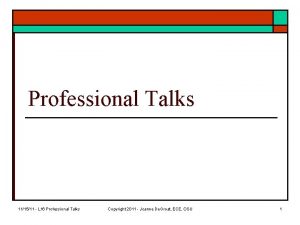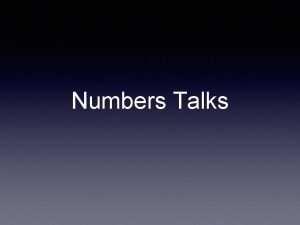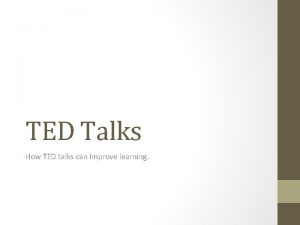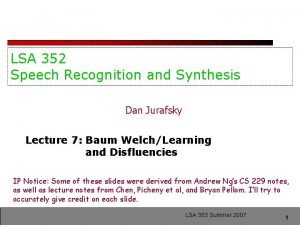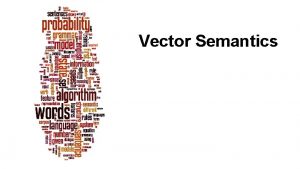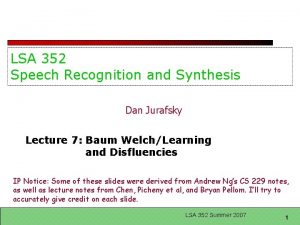Think 53 Food Talks Dan Jurafsky Yoshiko Matsumoto




![Franz Boas [the grammar of a language]. . . determines those aspects of experience Franz Boas [the grammar of a language]. . . determines those aspects of experience](https://slidetodoc.com/presentation_image/5023b5b16e89854668ba954d52fdaf85/image-5.jpg)











































































- Slides: 80

Think 53: Food Talks Dan Jurafsky & Yoshiko Matsumoto Language, Thought, and Dessert Tuesday, April 11, 2017

What is the relationship between language and thought? Does speaking another language lead you to think differently? Do languages differ arbitrarily or are there universal elements of language?

Outline for today 1. Linguistic Relativity 2. This language has 100 words for X 3. This language has 0 words for X 4. Linguistic Universals

Sapir-Whorf Hypothesis Edward Sapir (1884 -1934) ◦ Anthropologist and linguist ◦ First classification of the languages of the Americas Benjamin Lee Whorf (1897 -1941) ◦ Fire prevention engineer ◦ Worked his day job at the Hartford Fire Insurance Company while doing linguistics on the side.
![Franz Boas the grammar of a language determines those aspects of experience Franz Boas [the grammar of a language]. . . determines those aspects of experience](https://slidetodoc.com/presentation_image/5023b5b16e89854668ba954d52fdaf85/image-5.jpg)
Franz Boas [the grammar of a language]. . . determines those aspects of experience that must be expressed When we say "The man killed the bull" we understand that a definite single man in the past killed a definite single bull. We cannot express this experience in which a way that we remain in doubt whether a definite or indefinite person or bull, one or more persons or bulls, the present or past time are meant. We have to choose between aspects and one or the other must be chosen. The obligatory aspects are expressed by means of grammatical devices (1938: 132)

Sapir: "Human beings do not live in the objective world alone, nor alone in the world of social activity as ordinarily understood, but are very much at the mercy of the particular language which has become the medium of expression for their society. It is quite an illusion to imagine that one adjusts to reality essentially without the use of language and that language is merely an incidental means of solving specific problems of communication or reflection. The fact of the matter is that the 'real world' is to a large extent unconsciously built upon the language habits of the group. No two languages are ever sufficiently similar to be considered as representing the same social reality. The worlds in which different societies live are distinct worlds, not merely the same world with different labels attached. . . We see and hear and otherwise experience very largely as we do because the language habits of our community predispose certain choices of interpretation. " Sapir (1958: 69)

Whorf We dissect nature along lines laid down by our native languages. The categories and types that we isolate from the world of phenomena we do not find there because they stare every observer in the face; on the contrary, the world is presented in a kaleidoscopic flux of impressions which has to be organized by our minds -- and this means largely by the linguistic systems in our minds. We cut nature up, organize it into concepts, and ascribe significances as we do, largely because we are parties to an agreement to organize it in this way -- an agreement that holds throughout our speech community and is codified in the pattern of our language. The agreement is, of course, an implicit and unstated one, BUT ITS TERMS ARE ABSOLUTELY OBLIGATORY: we cannot talk at all except by subscribing to the organization and classification of data which the agreement decrees. "Science and Linguistics (c. a. 1940).

Development • Boas: “. . . it determines those aspects of experience that must be expressed. . . ” • Sapir: Language is a guide to "social reality. " • Whorf: We dissect nature along lines laid down by our native languages

Wilhelm von Humboldt (1767 -1835) Language as Weltanschaung (worldview) “Each tongue draws a circle about the people to whom it belongs, and it is possible to leave this circle only by simultaneously entering that of another people. ” but “one always caries over into a foreign tongue to a greater or lesser degree one’s own cosmic viewpoint — indeed one’s personal linguistic pattern. ” Slide from Jim Morgan

Sapir-Whorf Hypothesis “Language shapes thought: Your thoughts, percepts, and actions are influenced/determined by the language you speak. ” Strong version: Linguistic Determinism ◦ Language dictates thought: Speaking a certain language makes you unable to think certain thoughts that speakers of other languages could think. Weak version: Linguistic Relativity ◦ Speakers of different languages “end up attending to, partitioning, and remembering their experiences differently simply because they speak different languages” (Boroditsky 2003)

Historical milieu: Whorf and Einstein Whorf was influenced by recent popularity of Einstein’s theories of relativity. ◦ The idea that there is no such thing as “absolute time” and that time is relative to the observers His idea was that objectifying time as a nominal “thing” was true of English but not true of Hopi, where temporal relations were more often expressed adverbially, relationally. So for Whorf, Hopi was more “true” to relativity.

Foreshadowing our discussion of metaphor in Week 3 Time is understood directly, but is conceptualized via metaphor, which we can inspect by looking critically at our language. ◦ Time is money ◦ “Not worth my time”, “invest some time in this”, “spare me some time” ◦ Time is a spatial dimension ◦ “We’re coming up on week 2”, “the following days”

Linguistic relativism fell out of favor in the 1960 s Chomsky proposed that human language was innate and universal, and there were no real differences between languages Cultural relativism seemed like a throwback to thinking “primitive people had primitive thoughts”- the Noble Savage.

The recent revival of linguistic relativism Especially in this century. Experimental results that we saw Thursday and we'll do more of today Their claim: speakers of different languages “end up attending to, partitioning, and remembering their experiences differently simply because they speak different languages

Intuitions on both sides Linguistic relativity: ◦ Look how different the words and grammar are that speakers use in different language! In using these different words speakers must be therefore focusing on/attending to the world differently. Linguistic uniformity: ◦ These speakers all think exactly the same, but when they have to talk, they just talk differently.

Whorf and time in Hopi Whorf suggested Hopi had a different model of time than English ◦ It's kind of hard to understand exactly what he meant ◦ But the popular press immediately extended that to “Hopi has no concept of time!!!! ◦ Recent research suggests that Hopi certainly has a concept of time, although the language has a very different temporal system than English. Let’s look at a another difference in time representations: Mandarin vs. English

Spatial frames of reference "The spatial frame of reference of a given language influences spatial thought in many tasks, such as recall, recognition, and making inferences " Mc. Donough, Choi and Mandler (2003)

Time in Mandarin versus English Both English and Mandarin can talk about time as a “horizontal” axis.

Time in Mandarin versus English Mandarin can also talk about time as a “vertical” axis. 上个月 “last month” Shang ge yue UP[classifier] MONTH 下个月 “next month” xia ge yue DOWN [classifier] MONTH 上个星期 “last week” Shang ge xing qi UP [classifier] WEEK 下个星期 “next month” xia ge xing qi DOWN [classifier] WEEK 上次 “last time” Shang ci UP TIME 下次 “next time” xia ci DOWN TIME The “Waterfall of time”

Prevalence of the two time metaphors in English vs. Mandarin texts

If Mandarin speakers talk about time vertically more often than English speakers, Do they also think about time vertically more than English speakers?

Fuhrman et al. (2011) “If I tell you that this here is TODAY, where would you put YESTERDAY? And where would you put TOMORROW? ” Also Breakfast and Dinner with respect to Lunch, and September and October with respect to August

Fuhrman et al. (2011) results

Boroditsky results: Controlling for writing direction Ask participants how often they read text left to right, right to left, up to down. Results held for participants who only read leftto-right.

Boroditsky’s conclusions • English and Mandarin speakers differ in their representations of time • Mandarin speakers arrange events in vertical plane 15 -44% • English speakers arrange events in vertical plane 2. 5% • Mandarin bilinguals arranged events vertically even when speaking English • These differences in people’s time representations were predicted by patterns in language.

Other experiments on spatial Mc. Donough Choi and Mandler 2003 reasoning

Detecting kkita “fit-tightly” Infants succeeded; Englishspeaking adults failed

Anti-Whorfian arguments Pinker 1984. “The Language Instinct” Pinker really hates Whorfianism “wrong, all wrong!”

Anti-Whorfian arguments Pinker 1984. “The Language Instinct” Pinker is arguing against ◦ Strongest possible Strong Whorfianism: "thought is the same thing as language" (Pinker 1984) Pinker's counter-argument 1. We can think visually in terms of images Lots of fun evidence for this: Kosslyn's mental rotation 2. Hence thought cannot be the same as language

Anti-Whorfian arguments Problem with Pinker's 1984 argument. "Thought is the same thing as language" is kind of a straw man, not the same as any of the positions we're discussing Linguistic relativity: ◦ Look how different the words and grammar are that speakers use in different language! In using these different words speakers must be therefore focusing on/attending to the world differently. Linguistic uniformity: ◦ These speakers all think exactly the same, but when they have to talk, they just talk differently.

Part II: Language X has Y words for Z

Another aspect of Linguistic Relativity, also due to Whorf We have the same word for falling snow, snow on the ground, snow packed hard like ice, slushy snow, wind-driven flying snow -whatever the situation may be. To an Eskimo, this all-inclusive word would be almost unthinkable; he would say that falling snow, slushy snow, and so on, are sensuously and operationally different, different things to contend with; he uses different words for them and for other kinds of snow. (Whorf 1940 )

Eskimos and snow!!!

History of the Myth Anthropologist Franz Boas 1911 Notes that English has different roots for different kinds of water: ◦ ◦ river (running water) brook (small running water). rain (water falling from sky) lake (large still water) 4 words for snow in “Eskimo” (Eastern Canadian Inuktitut) ◦ ◦ aput ‘snow on the ground’ qana ‘falling snow piqsirpoq ‘drifting snow’ qimuqsuq ‘a snow drift’

1940: Whorf’s “ 5 Eskimo words for snow” We have the same word for falling snow, snow on the ground, snow packed hard like ice, slushy snow, winddriven flying snow -- whatever the situation may be. To an Eskimo, this all-inclusive word would be almost unthinkable; he would say that falling snow, slushy snow, and so on, are sensuously and operationally different, different things to contend with; he uses different words for them and for other kinds of snow. (Whorf 1940 )

The number of words skyrockets Martin (1986) ” 3” Brown 1958 “ 3 Eskimo words for snow” “Many” Eastman 1975 “ 50” Langford Wilson 1978 play “The Fifth of July” “ 9” The Straight Dope. Compendium. 1984. “ 100” 1984 New York Times “ 200” WEWS-Cleveland 1984 broadcast

What’s the lesson Bad science journalism ◦ Nobody checked with a linguist People need a way to operationalize cultural importance Words seem like a natural sign of something

Fine, but how many Eskimo words are there for snow?

Somewhat a tricky question How many 1. Eskimo 2. Words 3. For snow?

Eskimo: a loose term • Technically: Inuit and Yupik peoples • Living in Alaska, Canada, Greenland, Siberia • Speaking • Central Alaskan Yup'ik • West Greenlandic (Kalaallisut) • Inuktitut


Words Roots: ◦ Snow, slush Inflected or compounded words formed from that root ◦ snowing, snowy, snowier, snowiest, slushy, snowfall, snowflake, snowdrift, snowcapped, snowbank, snowstorm Inuit and Yupik languages have very rich morphologies

Morphology in Inuktitut Mallon (2000) 699 verb endings in the North Baffin dialect 1) Inuktitut nouns and verbs can be singular, dual and plural. takujunga takujuguk takujugut I see we two see we several see 2) instead of words because, if, whether, Inuktitut uses different verb endings takugama takugunnuk takungmangaatta because I see if we two see whether we several see 3) Different verb endings for nonspecific vs. specific situations. takujunga takugama I see because I see takujagit takujara takugakku I see you I see him because I see him

Morphology in Inuktitut Nouns have roots plus other chunks umiaq boat umiaq + juaq big boat (ship) umiaq + juaq + mi in the ship Some noun chunks expand on the meaning of the noun: umiaq boat umiaq + lik boat-owner umiaq + lik + mutto the boat-owner You can pile up noun chunks umiaq + juaq + lik + viniq + mit from the former ship-owner

Morphology in Inuktitut mit + vik + liaq + juma + lauq + juq + guuq VR NM VM vc vc ve tail land place go to want past he he says “he said he wanted to go to the landing strip mivviliarumalauqturuuq “

Snow What counts as a word for “snow”? Example: Canadian Inuit igluksaq ‘snow for igloo making’ But this is really glossed as iglu ‘house’ ksaq ‘material for’ So it means “building materials” and includes plywood, nails, etc. in addition to snow

Yes, Dan, but how many Eskimo words are there for snow? Geoff Pullum in his article “The Great Eskimo Vocabulary Hoax” asked linguist Anthony Woodbury (University of Texas) Woodbury says, based on Steven A. Jacobson’s Yup’ik Eskimo Dictionary (U of Alaska Fairbanks 1984): “A dozen or maybe two dozen”

Hmm, 2 dozen Snow, slush, sleet…. avalanche blizzard hardpack powder flurry dusting snow cornice


So what does this mean for the Sapir-Whorf Hypothesis? To discuss in section!! And for paper #1!

Instead of “ 100 words for X” We sometimes hear “Language X has no word for X” What are the implications?

Let’s look at one example

Dessert What is a dessert?

Dessert French, first used in 1539, the participle of desservir, “de-serve”, to clear the table The stuff you ate after the table was cleared

Dessert was new in England or France Europe wasn’t traditionally big on dessert. Herodotus 5 th century BCE talking about the Persians: [The Persians] have few solid dishes, but many served up after as dessert [“epiphorēmata”], and these not in a single course; and for this reason the Persians say that the Hellenes leave off dinner hungry, because after dinner they have nothing worth mentioning served up as dessert, whereas if any good dessert were served up they would not stop eating so soon.

Medieval Baghdad had dessert A meal from 1001 Nights: roasted chicken, roast meat, rice with honey, pilaf, sausages, stuffed lamb breast, nutty kunāfa swimming in bee’s honey, zulābiyya “donuts, ” qatā’if pancakes folded around a sweet nut filling, and baklava.

Sweet dishes come to Europe These desserts came first to Muslim Al-Andalus The mythological Ziryab, a musician who arrived in 822 at the court of Abd-al-rahman II of Cordoba By 1250, Spanish cookbooks said that meals should end in desserts And sweet dishes throughout the meal spread across Europe from Spain and Catalonia ◦ zirbaja, sweet-and-sour chicken stew, ◦ jullabiyya, chicken made with rose- syrup (shara b aljulla b, from the Persian word for rose), ◦ lamb stewed with quince, vinegar, saffron, and coriander.

And sweet things slowly move to the end of the meal Historian Jean-Louis Flandrin’s study of sugar in French recipes over time

Dessert in English • 1612 the word first used in English “such eating, which the French call desert, is vnnaturall, being contrary to Physicke or Dyet. ” • But it just still means fruit/nuts • By 1789, at a Manhattan dinner party after Washington’s inauguration, the modern US meaning: “The dessert was, first apple pies, puddings, etc. ; then iced creams, jellies, etc. ; then water-melons, muskmelons, apples, peaches, nuts. ”

The grammar of cuisine • Dessert is not universal • It’s a recent, contingent culture meme. • Part of the implicit “grammar of cuisine” American Dinner = (salad/appetizer) main (dessert) French dinner = (entre e) plat (salade) (fromage) (dessert) Italian dinner = (antipasto) primo secondo (insalata) (formaggi) (dolce) • Even this order is recent: Before 1900, Americans used to eat salad at the end of the meal.

No word for “dessert” in Chinese Traditional Chinese meal didn’t have a sweet course at the end. The standard translation for “dessert”: Cantonese tihm ban 甜品 Mandarin tián diǎn 甜点 really just meant “sweet food/snack” Traditional Cantonese meals end in soup or sometimes fruit.

Back to our question: What does it mean if a language has “no word for X” To discuss in section!

4. Is everything relative? What is universal?

Universals in Color Words Berlin and Kay (1969) had speakers of different languages name color categories on a chart:

Color Universals Berlin & Kay (1969): languages name colors in a universal, evolutionary order Slide from Jim Morgan

Different languages have similar focal colors Berlin&Kay 69

Berlin and Kay’s Universal Trends in Basic Color Names # of terms in a language: Two: Three: Four: Five: Six: Seven: black Eight +: white and black (light and dark) red, white, black yellow or green, red, white, black yellow, green, red, white, black blue, yellow, green, red, white, black brown, blue, yellow, green, red, white, purple/pink/orange/grey + above

A language with 3 colors Krahn/Wobé, spoken in Ivory Coast

Why? Two theories Universalist: Color categories in the world’s languages are organized around six universal focal colors corresponding to the prototypes of English black, white, red, green, yellow, and blue. The boundaries between colors are projected from these foci and lie in similar positions across languages Relativist: Color categories are defined at their boundaries by local linguistic convention, which is free to vary across languages.

Why? A third answer: Universal properties of the human visual system

Universals in Color Words The Munsell color chart

Human experiments tell us the "perceptual space" of color

Human experiments tell us the "perceptual space" of color

Given any two color chips We can measure how similar they are according to the human visual system Regier et al's proposal ◦ Boundaries of color names tend to lie at places that make all the color chips within a category more similar to teach other, and all the chips across categories more different

Why? Universals of The Human Visual System Terry Regier, Paul Kay, and Naveen Khetarpal (2007) Color groupings optimize human categorization; the set of names makes it most likely that chips are perceived similarly (given human vision system) will be named similarly.

Why? Universals of The Human Visual System Terry Regier, Paul Kay, and Naveen Khetarpal (2007) Color groupings optimize human categorization; the set of names makes it most likely that chips are perceived similarly will be named similarly.

An alternative hypothesis for the origin of basic color terms Ken Shirriff (1990) Journal of Irreproducible Results “Why do languages follow these rules? My hypothesis is that cultures find it necessary to develop words for colors in order to do their washing. That is, language follows laundry. This is a bold claim, but the evidence is compelling: the rules of laundry directly account for the rules of color terms”

Language follows Laundry Shirriff 1990 Colors must be separated for laundry (Tide 1991), elaborated as the basic rule of laundry: ‘‘Always separate darks and lights. ’’ (Gottesman 1991). Thus in order to wash clothing, a culture must first have words to distinguish darks and lights, explaining color rule #1. The second rule of laundry is ‘‘Never wash reds with anything even remotely white’’ (Gottesman 1991). Cultures must next develop a word for ‘‘red’’. Rule #2. For more advanced laundry, bright colors, such as green and yellow, should be washed separately. Rules #3 and #4. Next, cultures will discover that washing blue jeans separately is beneficial, resulting in rule #5. Finally, the remaining colors will be named. Rules #6 and #7. References Gottesman, Greg. 1991. ‘‘Laundry and Ironing’’ in College Survival. NY: Prentice Hall. Tide detergent (box). 1991. Cincinnati: Procter and Gamble.

Other Potential Universals? Including Sound Symbolism, Thursday!

Some conclusions There is some truth to both linguistic universalism and relativism Academics come in two varieties: ◦ "Those who make many species are the 'splitters, ' and those who make few are the 'lumpers. '” Charles Darwin, 1857 But even if speaking a different language only makes you think a little differently, that’s pretty worthwhile! Go take a language Check your sources.
 Yoshiko imamoto
Yoshiko imamoto Ansiolticos
Ansiolticos Opiceos
Opiceos Wilson kioshi matsumoto
Wilson kioshi matsumoto Dhirubhaism
Dhirubhaism Jurafsky nlp
Jurafsky nlp Dan jurafsky nlp slides
Dan jurafsky nlp slides Jurafsky and martin
Jurafsky and martin A little bird by aileen fisher
A little bird by aileen fisher Think fam think
Think fam think Unit 2 food food food
Unit 2 food food food Sequence of food chain
Sequence of food chain Things a computer scientist rarely talks about
Things a computer scientist rarely talks about Ted talk the power of introverts
Ted talk the power of introverts Forsonline
Forsonline Atividade autobiografia 7 ano
Atividade autobiografia 7 ano Rekenrek number talks
Rekenrek number talks Number talks hand signals
Number talks hand signals Throwing giant scorpion shadows
Throwing giant scorpion shadows Two types of talk
Two types of talk 20 days of number sense
20 days of number sense How did mayella get rid of the children
How did mayella get rid of the children Ted talks
Ted talks What runs but never walks has a mouth that never talks
What runs but never walks has a mouth that never talks Homesick carol ann duffy
Homesick carol ann duffy The rebel disturbs a class
The rebel disturbs a class Your friend talk/talks too much
Your friend talk/talks too much Snover x giggles
Snover x giggles Steve wyborney number talks
Steve wyborney number talks Microsoft tech talks
Microsoft tech talks Bad talks
Bad talks Merdeka talks
Merdeka talks Drivers training toolbox
Drivers training toolbox Noise toolbox talk
Noise toolbox talk Food scientists measure food energy in:
Food scientists measure food energy in: Importance of food
Importance of food Tcs food
Tcs food Quantifier of food
Quantifier of food Primary secondary tertiary food chain
Primary secondary tertiary food chain Food handlers can contaminate food when they
Food handlers can contaminate food when they Food product design by eric schlosser
Food product design by eric schlosser Sample food chains
Sample food chains Food chains are interconnecting food webs.
Food chains are interconnecting food webs. How does the food chain go
How does the food chain go Fast food can be defined as any food that contributes
Fast food can be defined as any food that contributes Polar bear food web
Polar bear food web Food chain consumer levels
Food chain consumer levels Food web and food chain
Food web and food chain Explore food a fact of life
Explore food a fact of life Junk food vs healthy food project
Junk food vs healthy food project Food chains, food webs and ecological pyramids
Food chains, food webs and ecological pyramids Food webs and energy pyramids
Food webs and energy pyramids Food webs and energy pyramids worksheet answers
Food webs and energy pyramids worksheet answers Chapparal food web
Chapparal food web How many food chains are there in the food web
How many food chains are there in the food web Role play on healthy food and junk food
Role play on healthy food and junk food Introduction of role play
Introduction of role play Junk milk
Junk milk Energy pyramid deciduous forest
Energy pyramid deciduous forest Food pyramid guide
Food pyramid guide Junk food
Junk food What is food safety
What is food safety Food resources world food problems
Food resources world food problems Food a fact of life
Food a fact of life Paragraph fast food
Paragraph fast food When should hand antiseptics be used
When should hand antiseptics be used A food handler stored a sanitizer spray bottle
A food handler stored a sanitizer spray bottle What do you think of the picture
What do you think of the picture Swimming
Swimming What do you think has just happened in these photos
What do you think has just happened in these photos What is the person doing in the picture
What is the person doing in the picture Infant development
Infant development Uster spectrogram analysis
Uster spectrogram analysis What is think aloud strategy
What is think aloud strategy Kagan math strategies
Kagan math strategies Tucker turtle takes time to tuck and think
Tucker turtle takes time to tuck and think Membuat nota kaedah pemetaan
Membuat nota kaedah pemetaan Nancy kline 10 components
Nancy kline 10 components Thinkpairshare
Thinkpairshare Think public relations
Think public relations Think pair share video
Think pair share video






